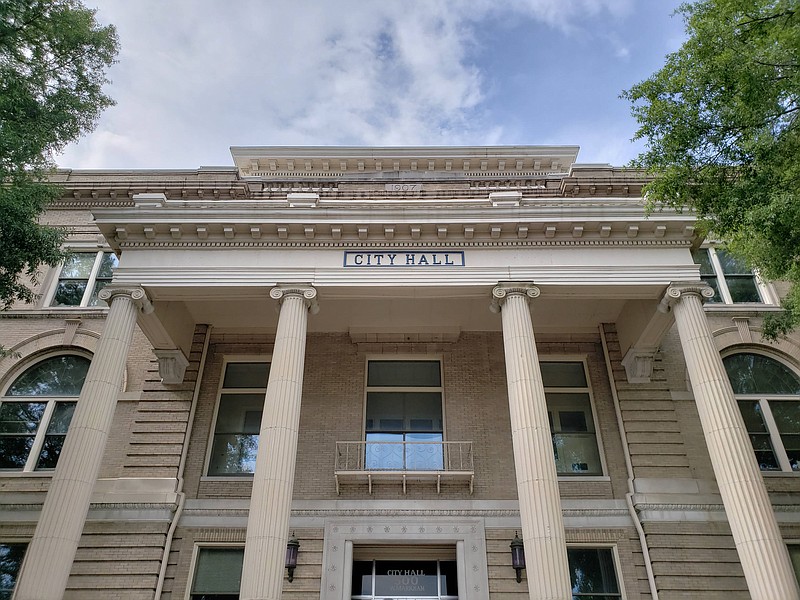Several members of the Little Rock Board of Directors submitted recommendations for how the city ought to use direct aid from the American Rescue Plan Act approved by Congress this spring, according to email records.
The city is expected to receive a total of more than $37 million by this time next year. The federal government disbursed half of the sum to Little Rock in May.
Little Rock received the largest allocation among all metropolitan cities in Arkansas that are receiving direct aid, according to the U.S. Treasury Department.
Mayor Frank Scott Jr. had asked city directors for input on how to spend the money from the covid-19 relief package. The heads of various city departments submitted recommendations at Scott's request earlier this year as well.
What city officials will do with the federal windfall has not been determined.
In May, Emily Jordan Cox, the city's director of strategic operations, told board members that the Arkansas Municipal League had advised local governments not to spend the funds yet because federal guidelines as well as a formula to calculate lost revenue were not final.
[DOCUMENT: Read city directors' suggestions for using federal funds » arkansasonline.com/718arpa/]
According to the Treasury Department, federal stimulus funds can be spent within five categories: public health; replacing lost public-sector revenue; investing in water, sewer or broadband infrastructure; addressing negative economic effects of the pandemic; and providing extra pay to essential workers.
At least half of the 10 elected city directors serving on the board weighed in, according to public records.
At-large City Director Joan Adcock wrote a list of approximately a dozen items, some with subcategories.
They included summer jobs for youth, extended hours at the Boys and Girls Club of Central Arkansas and community centers, and partnering those centers with the Little Rock School District.
Adcock recommended an effort to clean up the city by paying youths and seniors.
She also asked for better pay for staff of the Little Rock Animal Village, which she said was down by half in terms of staff because they were leaving to work in other cities.
Vice Mayor Lance Hines emailed City Manager Bruce Moore and Scott on June 2 to suggest the city work with Pulaski County and the Little Rock Water Reclamation Authority on sewer work in the Little Maumelle basin. Additionally, he recommended partnering with the county on work related to Cooper Orbit Road and the western part of Kanis Road past Chenal Parkway.
[CORONAVIRUS: Click here for our complete coverage » arkansasonline.com/coronavirus]
Hines also recommended funding the acquisition of land at the Little Rock Port.
In a follow-up email, the vice mayor encouraged expanded capacity at the Fourche Creek Wastewater Treatment Plant "for economic development purposes."
The board's newest member, at-large City Director Antwan Phillips, emailed a list of 11 items to the mayor and city manager for consideration.
His recommendations included funding for initiatives under a targeted community development resolution that was approved by the board earlier this year, increasing one-time funding for violence-prevention programs and investing to create more affordable housing through rehabilitation or development.
Other suggestions from Phillips included the expansion of a small business grant program for businesses and nonprofits and the addition of Wi-Fi towers south of Interstate 630.
City Director Ken Richardson, who represents Ward 2, wrote to say he concurred with Phillips' recommendations.
Richardson suggested that "we can fine[-]tune this approach to ensure infrastructure redevelopment via human capital redevelopment."
"This approach is far better than adding more police officers to address the social ills that produce the crime that we 'selectively' complain about," Richardson wrote June 3. "I'll say it again to the tune of a broken record, we can't POLICE our way out of this!!!"
City Director Capi Peck, the board's Ward 4 representative, wrote to Moore and Scott to advocate "[e]vidence-based community violence intervention programs" amid an increase in violence during the pandemic.
Peck added, "In addition to the increase in gun violence, there has been a tremendous increase in domestic violence and abuse. I would like to see us work closely with the [Little Rock Police Department] and Women & Children First."
Broadband infrastructure expansion, cleaning and protecting the Fourche Creek watershed, green infrastructure projects and promoting a healthy childhood environment with programs geared toward hunger, food deserts and community gardening rounded out Peck's recommendations.
If they exist, recommendations sent by the other members of the city board were not included among the records that were provided to the Arkansas Democrat-Gazette in response to a recent Freedom of Information Act request.
CORRECTION: The American Rescue Plan Act was approved by Congress this spring. An earlier version of this story included an incorrect reference to when the legislation was passed.
